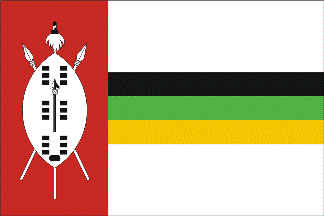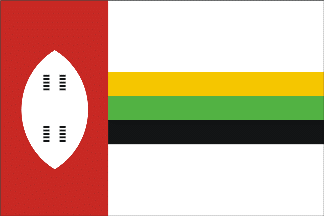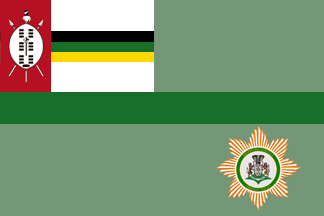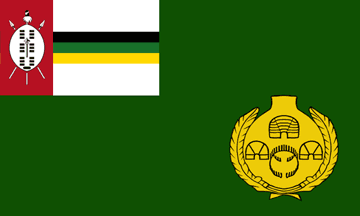 image
by Martin Grieve, 21 Dec 2006
image
by Martin Grieve, 21 Dec 2006 
Last modified: 2013-02-08 by bruce berry
Keywords: south africa | homeland | kwazulu |
Links: FOTW homepage |
search |
disclaimer and copyright |
write us |
mirrors
The former KwaZulu homeland was relatively large but highly segmented in enclaves and exclaves all over
the former
Natal
province (today's
KwaZulu/Natal), one of which
completely adjoins the Mozambican border in the north. It also bordered on
Transkei in the south.
Antonio Martins, 30 May 1999
The self-governing homeland of KwaZulu comprised a large number of non-contiguous
parts spread throughout the Zululand and Natal. The homeland was granted
internal self-government on 01 February 1977.
Bruce Berry, 01 Dec 1998
 image
by Martin Grieve, 21 Dec 2006
image
by Martin Grieve, 21 Dec 2006
The 1977 flag was replaced on 14 January 1985 by an amended design which was
prescribed in the KwaZulu Flag Amendment Act of 1984.
The description of the amended flag reads as follows:
"The width of the flag of KwaZulu shall be equal to two-thirds of its
length.
On left of the flag shall be a vermilion vertical panel of which the
width shall be equal to one-third of the width of the flag and in the middle
of this panel shall be portrayed in white a shield, five-ninths the height
of the flag, superimposed on the plumed staff and spears in saltire of
a Zulu warrior.
The right hand portion of the flag shall be divided into five horizontal
panels.
The top and bottom panels shall be white and each of these panels shall
be equal to one third of the height of the flag.
The middle three portions shall be equal in width and coloured from
top to bottom, black, green and gold".
The Inkatha Freedom Party, which exercised political control in KwaZulu
had its origins in the African National Congress (ANC). In the first of
the KwaZulu flags, the stripes in the middle of the flag were the reverse
of the ANC. In the later version, this was changed to the order found on
the ANC flag, namely black, green and gold. These colours are said the
represent the people (black), the land (green) and natural wealth and resources
(gold). White and red are the additional colours of Inkatha. Whereas the
first flag bore a plain white shield on the hoist panel, a further change
in the amended design is the addition of a full shield, staff and spears
of a Zulu warrior.
KwaZulu was re-incorporated into South Africa on 27 April 1994 and
is now part of the KwaZulu-Natal province. The homeland flag is no longer
in use.
The flag of the Inkatha Freedom Party (IFP)
consists of seven horizontal stripes of red, white, black, green, gold,
white and red.
Bruce Berry, 01 Dec 1998
 image
by Martin Grieve, 21 Dec 2006
image
by Martin Grieve, 21 Dec 2006
The design of the original flag of Kwazulu is set out in section
2 of the KwaZulu Flag Act of 1977, which reads as follows:
"The width of the flag of KwaZulu shall be equal to two-thirds of its
length.
On the left of the flag shall be a vermilion coloured vertical panel
of which the width shall be equal to one-third of the width of the flag
and in the middle of this panel shall be portrayed in white a shield of
a Zulu warrior, five-ninths the height of the flag.
The right hand portion of the flag shall be divided into five horizontal
panels.
The top and bottom horizontal panels shall be white and each of these
shall be equal to one-third of the height of the flag.
The middle three panels shall be equal in width and coloured from top
to bottom, gold, green and black".
Bruce Berry, 01 Dec 1998
 image by Jens Pattke, 24 Jan 2013
image by Jens Pattke, 24 Jan 2013
The design of flag of the KwaZulu Police is based on that of the South African Police and consists of a light green field with a dark green horizontal band one-seventh of the width of the flag across the centre. The second version of the KwaZulu flag is in the canton and the badge of the Kwazulu Police appears in the lower fly. The badge consists of a yellow ochre and white eight-pointed rayed star charged in the centre on a white roundel with the coat of arms of KwaZulu in full colour, within a green annulet bearing the words AMAPHOYISA AKWAZULU above and KWAZULU POLICE below, in yellow ochre letters.
kzpol.gif) image by Jens Pattke, 24 Jan 2013
image by Jens Pattke, 24 Jan 2013
Following the reincorporation of KwaZulu into South Africa on 27 April 1994, the
KwaZulu Police Force was amalgamated with the South
African Police Service and
this flag fell into abeyance.
Bruce Berry, 24 Jan 2013
 image by Jens Pattke, 21 Jan 2013
image by Jens Pattke, 21 Jan 2013
The flag of the KwaZulu Prisons Service (whose name was later changed to the KwaZulu Correctional Services) has a dark green field with the second KwaZulu flag in the canton, occupying one quarter the length of the field with the badge of the KwaZulu Prisons Service in gold, with black detail, in the lower fly. The flag was designed by the South African Bureau of Heraldry and the badge was registered under the Heraldry Act in April 1991. The badge consists of a gourd charged with a representation of the ground plan of a cattle kraal, with an inner kraal, above which are three Zulu huts; the gourd resting on a grass mat, all within and conjoined to two feathers tied together to form an open wreath.
kzpri.gif) image by Jens Pattke, 21 Jan 2013
image by Jens Pattke, 21 Jan 2013
Following the reincorporation of KwaZulu into South Africa on 27 April 1994,
KwaZulu Correctional Services amalgamated with the South
African Department of Correctional Services and consequently this flag is no
longer used.
Bruce Berry, 21 Jan 2013
zu.jpg) scan
by Bruce Berry, 21 Dec 2006
scan
by Bruce Berry, 21 Dec 2006
By Government
Notice No. 1599, published in the South African Government Gazette
(Number 3644 of 08 September 1972) it was notified that a coat of arms had been
registered for the KwaZulu Legislative Assembly in terms of the South African
Heraldry Act (Act No. 18 of 1962). The South African State Herald did not issue
a formal certificate of registration in terms of the Heraldry Act in respect of
these Arms as they had been devised without consultation of the Bureau of
Heraldry.
The blazon of the coat of arms is described as:
Arms: Argent, a Zulu Royal Sceptre erect proper, accompanied on
either side by nine spear thongs in pale and in base pied of an oval Sable.
Crest: A head-ring Sable, thereon an elephant’s head caboshed
proper.
Supporters: Dexter a leopard clasping in its sinister claw a spear erect
and sinister a lion clasping in its dexter claw a spear, proper.
Motto: SONQOBA SIMUNYE (Together we shall surmount)
With the
re-incorporation of KwaZulu into South Africa on 27 April 1994, these Arms are
no longer used.
Bruce Berry, 21 Dec 2006